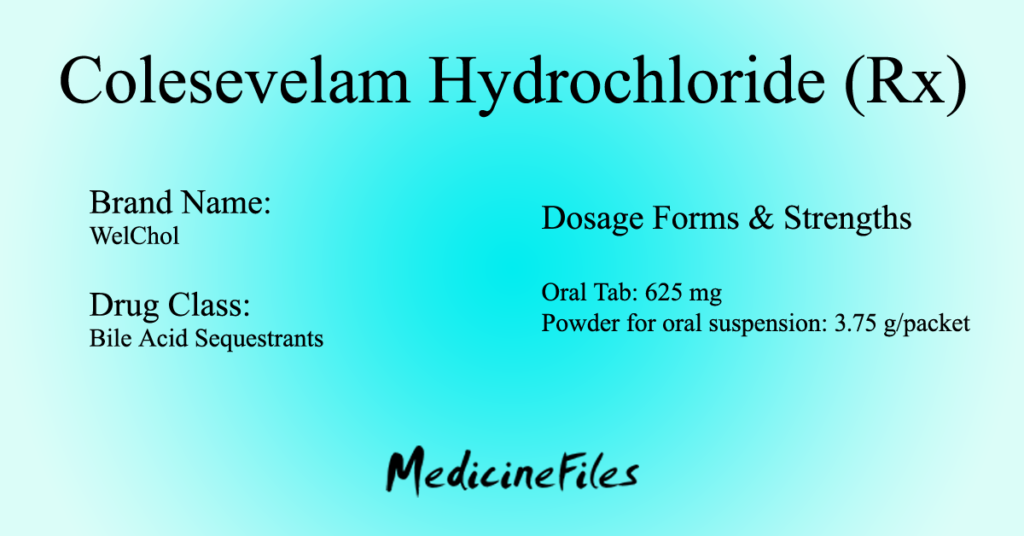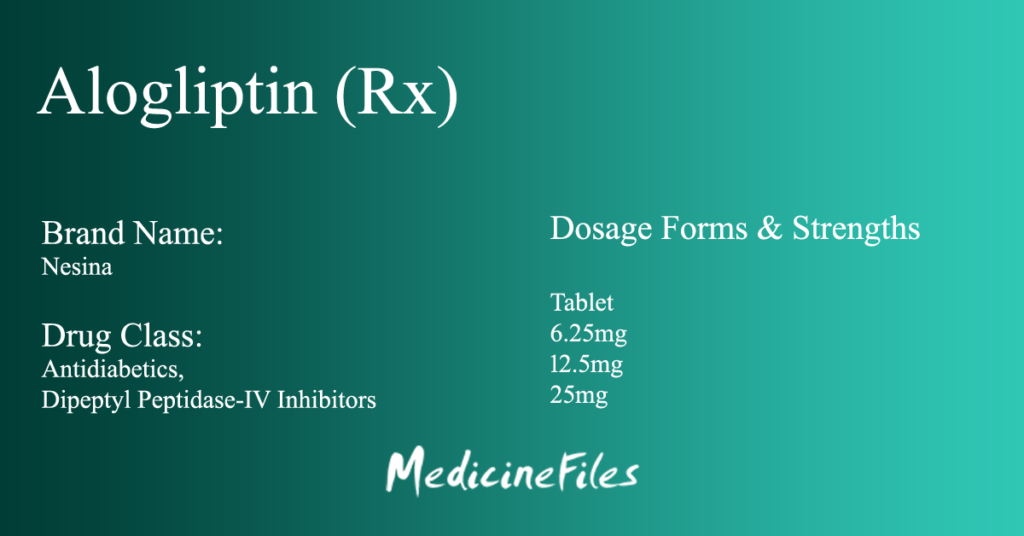Colesevelam Hydrochloride (Rx)
Colesevelam Brand name: WelChol
Dea Class: Rx (Prescription drug)
Drug Class: Bile Acid Sequestrants
Dosage form: Oral Tab: 625mg and Powder for oral suspension: 3.75g/packet
Table Of Content
- What Is Colesevelam?
- How it works?
- How should I take Colesevelam?
- Side effects associated with Colesevelam.
What is Colesevelam?
This medication is used along with a proper diet and exercise to lower cholesterol in people with high levels of cholesterol in the blood. Lowering cholesterol decreases the risk of heart disease and helps prevent strokes and heart attacks. Colesevelam is also used along with a proper diet and exercise to lower high blood sugar in people with type 2 diabetes.
Colesevelam is sometimes used together with “statin” cholesterol medications such as atorvastatin, lovastatin, simvastatin, Crestor, Lipitor, Pravachol, Zocor, and others.
It is used to treat high cholesterol in adults and children at least 10 years old.
How it works?
Colesevelam belongs to a class of drugs called bile acid-binding resins. Colesevelam works by binding to bile acids in the intestine, preventing their reabsorption. This process forces the liver to use cholesterol to produce more bile acids, thereby lowering cholesterol levels. It is not known how colesevelam works in lowering blood sugar.
How should I take Colesevelam?
Follow all directions on your prescription label and read all medication guides or instruction sheets. Use the medicine exactly as directed.
The tablets are usually taken once or twice a day with meals and a full glass of water or other liquid. If you have trouble swallowing the tablet, talk to your doctor about switching to the powder form of this medication.
Do not change the dose or timing of any other cholesterol or diabetes medications without your doctor’s advice.
Take this medication regularly to get the most benefit from it. To help you remember, take it at the same time(s) each day.
Colesevelam Side Effects
Side effects from colesevelam can occur. Tell your doctor if any of these symptoms are severe or do not go away:
Common side effects of colesevelam hydrochloride include:
- constipation,
- upset stomach,
- nausea,
- vomiting,
- gas,
- indigestion,
- feeling weak or tired,
- headache,
- muscle pain,
- runny nose,
- sore throat, or
- flu symptoms.
Serious side effects of Colesevelam hydrochloride include:
If you experience any of these symptoms, call your doctor immediately:
- trouble swallowing, or
- unusual bleeding or bruising.
- severe abdominal pain with or without nausea and vomiting
It may cause other side effects. Call your doctor if you have any unusual problems while taking this medication.
What Are Warnings and Precautions for Colesevelam?
Warnings
- You should not take Colesevelam hydrochloride if you have diabetic ketoacidosis, very high triglycerides, a history of bowel obstruction, or a history of pancreatitis caused by high triglycerides.
Before taking colesevelam hydrochloride, Cautions
Tell your doctor and pharmacist if you are allergic to colesevelam or any other medications.
You should not take colesevelam hydrochloride if you have:
-
very high levels of triglycerides (a type of fat) in your blood;
-
diabetic ketoacidosis (call your doctor for treatment);
-
a history of bowel obstruction; or
-
a history of pancreatitis caused by high triglycerides.
Tell your doctor if you have ever had:
-
trouble swallowing;
-
blockage in your digestive tract (stomach or intestines);
-
slow digestion;
-
surgery on your stomach or intestines; or
-
a vitamin A, D, E, or K deficiency.
Tell your doctor and pharmacist what other prescription and nonprescription medications, vitamins, nutritional supplements, and herbal products you are taking or plan to take.
It should not be given to a child younger than 10 years old.
Pregnancy and Lactation
Pregnancy
- Tell your doctor if you are pregnant or if you become pregnant.
Lactation
- This medication is unlikely to pass into breast milk or harm a nursing infant. Consult your doctor before breastfeeding.
What Are Dosages of colesevelam hydrochloride?
Dosage Forms & Strengths
Oral Tablet
- 625 mg
Powder for oral suspension
- 3.75 g/packet
Adult dosage
Dosage for Hyperlipidemia
Indicated as adjunctive therapy to diet and exercise to reduce elevated low-density lipoprotein cholesterol (LDL-C) in adults with primary hyperlipidemia
- Tablet: 1.875 g (3 tablets) orally every 12 hours or 3.75 g (6 tablets) orally once a day
- Oral suspension: 1.875 g (½ packet) orally every 12 hours or 3.75 g (1 packet) orally once a day
- Maximum dose: 3.75 g/day PO.
Type 2 Diabetes Mellitus
Indicated as adjunctive therapy to improve of glycemic control in adults
- Tablet: 1.875 g (3 tablets) PO q12hr or 3.75 g (6 tablets) PO qDay
- Oral suspension: 1.875 g (½ packet) PO q12hr or 3.75 g (1 packet) PO qDay
- Maximum dose: 3.75 g/day PO.
Pediatric Dosage
Heterozygous Familial Hypercholesterolemia
- Children below 10 years: Safety and efficacy not established
- Children between 10-17 years
- Tablet: 1.875 g (3 tablets) orally every 12 hours or 3.75 g (6 tablets) orally once a day
- Oral suspension: 1.875 g (½ packet) orally every12hour or 3.75 g (1 packet) orally once a day
- Due to tablet size, the oral suspension is recommended for use in the pediatric population
Dosing Considerations
Obtain lipid panel, including triglycerides (TG) levels and non-HDL-C, before starting treatment; contraindicated in patients with TG levels >500 mg/dL
Limitations of use
- Should not be used for treatment of type 1 diabetes or diabetic ketoacidosis
- Effect of colesevelam on cardiovascular morbidity and mortality not determined
-
Not studied
- Type 2 diabetes in combination with a dipeptidyl peptidase 4 inhibitor
- Fredrickson Type I, III, IV, and V dyslipidemia
- Children <10 years or in premenarchal girls
Colesevelam hydrochloride brand name
FAQs
How does Colesevelam interact with other medications?
Colesevelam can affect the absorption of several medications, including thyroid hormones, certain diabetes medications, and some blood pressure medications. It’s important to take other medications at least 4 hours before or after Colesevelam to avoid interactions.
-
cyclosporine;
-
olmesartan;
-
phenytoin;
-
levothyroxine or other thyroid medication;
-
birth control pills;
-
multivitamins;
-
warfarin (Coumadin, Jantoven); or
-
oral diabetes medication–chlorpropamide, glimepiride, glipizide, or glyburide, tolazamide, tolbutamide.
Can colesevelam hydrochloride be taken with other medications?
Yes, Colesevelam hydrochloride can be taken with other medications. However, it can interfere with the absorption of certain drugs. It’s important to take other medications at least 4 hours before or after taking Colesevelam hydrochloride to avoid interactions.
What should I avoid while taking colesevelam?
Avoid eating foods high in fat or cholesterol, or colesevelam will not be as effective.
Can Colesevelam cause weight gain?
Colesevelam is generally not associated with weight gain. If you notice significant changes in your weight, consult your healthcare provider.
Is Colesevelam safe during pregnancy or breastfeeding?
The safety of Colesevelam during pregnancy and breastfeeding has not been fully established. Consult with your healthcare provider if you are pregnant, planning to become pregnant, or breastfeeding before taking it.
What should I do if I miss a dose of Colesevelam hydrochloride?
If you miss a dose of Colesevelam hydrochloride, take it as soon as you remember. If it is almost time for your next dose, skip the missed dose and continue with your regular schedule. Do not take two doses at the same time.
What happens if I overdose?
Seek emergency medical attention or call the Poison Help line at 1-800-222-1222. If someone has overdosed and has serious symptoms such as passing out or trouble breathing.


